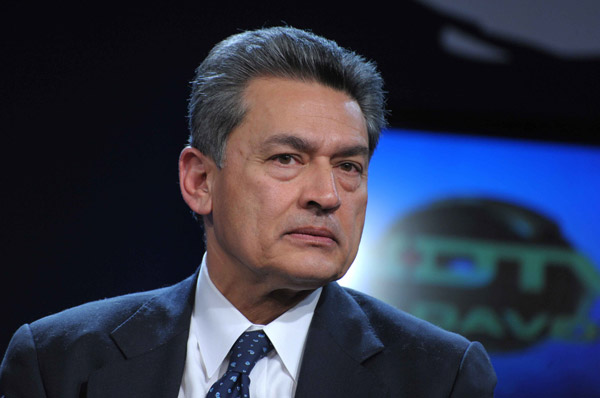Offbeat (21): Good deeds save Rajat Gupta from Harsh Sentence
By John B. Monteiro
Bellevision Media Network
06 November 2012: Good deeds have consequences beyond punya earned for reward after death. It can also earn you rewards here and now as demonstrated ie District of New York, Judge Jed S. Rakoff in the case United States of America V Rajat K Gupta, Defendent. This is an important case relating to insider trading and had made headlines worldwide. The jury had given its guilty verdict in June 2012 and the judgment was handed out on October 24. In the interim period, there was speculation about the length of imprisonment with judicial guidelines indicating a 8/10 years of imprisonment. The judge ended up giving a two-year sentence, surprising some and shocking others. Thisis a clear case of justice being tempered with mercy or compassion. The judge argues himself horse (in words on paper!) justifying his case for the lighter punishment. This makes educative and interesting reading.

The Court
therefore turns to the bedrock of all federal sentencing, section 3sentence.” The very first factor is “the nature and circumstances of the offense and the history and characteristics of the defendant”(emphasis supplied). Thus, at the very outset, there is presented the fundamental problem of this sentence, for Mr. Gupta’s personal history and characteristics starkly contrast with the nature and circumstances of his crimes. All the evidence before the Court -– not just the letters written on Mr. Gupta’s behalf but also the objective facts of record–- establish beyond cavil that Mr. Gupta has selflessly devoted a huge amount of time and effort to a very wide variety of socially beneficial activities, such as the Global Fund to Fight AIDS,Tuberculosis and Malaria, the Public Health Foundation of India, the Indian School of Business, the Pratham Foundation (which provides quality education to underprivileged children in India), the Cornell Medical School, the Rockefeller Foundation, and many many more. As well summarized in his counsel’s sentencing memorandum, such activities are but illustrations of Mr. Gupta’s big heart and helping hand, which he extended without fanfare or self-promotion, to all with whom he came in contact. While some have suggested that the large volume of poignant letters submitted on Mr. Gupta’s behalf are simply the strategem of a rich, well-connected defendant endeavoring to derail the Court from focusing on his crimes, this is simply not the case, for the facts recited in most of the letters are well documented and, i undisputed by the Government. The Court can say without exaggeration that it has never encountered a defendant whose prior history suggests such an extraordinary devotion, not only to humanity writ large, but also to individual human beings in their times of need.

The Guidelines virtually ignore this measure of the man, but here as elsewhere the Guidelines must take second place to section 3553(a), which requires a court to take account of a defendant’s character in imposing sentence. And how could it be otherwise, for on this day of judgment, must not one judge the man as a whole? But when one looks at the nature and circumstances of the
offense, the picture darkens considerably. In the Court’s view, the evidence at trial established, to a virtual certainty, that Mr. Gupta, well knowing his fiduciary responsibilities to Goldman Sachs,brazenly disclosed material non-public information to Mr. Rajaratnam at the very time, September and October 2008, when our financial institutions were in immense distress and most in need of stability, repose, and trust. Consider, for example, his tip to Rajaratnam on September 23, 2008. With Goldman Sachs in turmoil but on the verge of being rescued from possible ruin by an infusion of $5 billion, Gupta, within minutes of hearing of the transaction, tipped Rajaratnam, so that the latter could trade on this information in the last few minutes before the market closed. This was the functional equivalent of stabbing Goldman in the back.
So why did Mr. Gupta do it? Since motive is not an element of the offenses here in issue, it did not need to be proved at trial,and so one can only speculate. Having finished his spectacularcareer at McKinsey in 2007, Gupta, for all his charitable endeavors,may have felt frustrated in not finding new business worlds toconquer; and Rajaratnam, a clever cultivator of persons with information, repeatedly held out prospects of exciting new international business opportunities that Rajaratnam would help fund but that Gupta would lead. There is also in some of the information presented to the Court under seal an implicit suggestion that, afterso many years of assuming the role of father to all, Gupta may havelonged to escape the straightjacket of overwhelming responsibility,and had begun to loosen his self-restraint in ways that clouded his judgment. But whatever was operating in the recesses of his brain,
there is no doubt that Gupta, though not immediately profiting from tipping Rajaratnam, viewed it as an avenue to future benefits,opportunities, and even excitement. Thus, by any measure, Gupta’s criminal acts represented the very antithesis of the values he had previously embodied.So how does a court balance these polar extremes? In arguing for a non-guideline sentence in the Pre-Sentence Report, the experienced Senior U.S. Probation Officer Emily Frankelis had this to say: “We believe the defendant’s commission of the instant offenses was aberrant behavior – not aberrant as defined by the U.S.
Sentencing Guidelines, but rather as defined by Merriam-Webster:‘ . . . atypical.’” The Court agrees, and finds that the aberrant nature of Mr. Gupta’s conduct by itself would warrant a non-guidelinesentence, even aside from the other factors favoring leniency. But in order to find just the right sentence, the Court must also consider two further mandates of section 3553(a): first, “the need for the sentence imposed” to afford specific deterrence, general deterrence, “just punishment,” and the like; and, second, therequirement that any sentence imposed be “sufficient, but not greater than necessary, to complywith [these] purposes.”As to specific deterrence, it seems obvious that, having suffered such a blow to his reputation, Mr. Gupta is unlikely to repeat his transgressions, and no further punishment is needed to achieve this result. General deterrence, however, suggests a different conclusion. As this Court has repeatedly noted in other cases, insider trading is an easy crime to commit but a difficult crime to catch. Others similarly situated to the defendant must therefore be made to understand that when you get caught, you will go to jail. Defendant’s proposals to have Mr. Gupta undertake variousinnovative forms of community service would, in the Court’s view,totally fail to send this message. Moreover, if the reports of Mr.Gupta’s charitable endeavors are at all accurate, he can be counted on to devote himself to community service when he finishes any prison term, regardless of any order of the Court.
At the same time, no one really knows how much jail time isnecessary to materially deter insider trading; but common sense suggests that most business executives fear even a modest prison term to a degree that more hardened types might not. Thus, a relatively modest prison term should be “sufficient, but not more than necessary,” for this purpose.There are, however, still other factors set forth in §3553(a) that the Court must, and has, considered, of which perhaps the most difficult, but most important one, is the concept of “just punishment.” While all the other factors under section 3553 partake to a lesser or greater degree of policy considerations, “just punishment” taps a deeper vein. Human beings, as social animals, are programmed to respect moral values. This is why people without shame or guilt are considered psychopaths, and also why violations of the moral order raise such deep passions in the human breast. As peoplehave come to understand that insider trading is not only a sophisticated form of cheating but also a fundamental breach of trust and confidence, they have increasingly internalized their revulsionfor its commission. While no defendant should be made a martyr to public passion, meaningful punishment is still necessary to reaffirm society’s deep-seated need to see justice triumphant. No sentence of probation, or anything close to it, could serve this purpose. After carefully weighing all these, and other, relevant factors, the Court concludes that the sentence that most fulfills all requirements of section 3553(a) is two years in prison.
Rajat K.Gupta is therefore sentenced to 24 months’ imprisonment, concurrent on all counts, to be followed by one year of supervised release, on the terms stated from the bench and here incorporated by reference.The otherwise mandatory forfeiture has been waived by the Government,but Court imposes a fine in the sum of $5,000,000. The Court willdefer the determination of restitution for up to 90 days, as permitted by federal law. A formal Judgment embodying these terms and incorporating this Memorandum by reference will issue shortly.Meanwhile, Mr. Gupta is ordered to surrender to the designated prison by 2 p.m. on January 8, 2013.
Chew on this!
John B. Monteiro, journalist and author, is Editor of his website, www.welcometoreason.com (Interactive Cerebral Challenger) – with provision for instant response. Try responding! 
 Write Comment |
Write Comment |  E-Mail To a Friend |
E-Mail To a Friend |
 Facebook |
Facebook |
 Twitter |
Twitter |
 Print
Print | Comments on this Article | |
| Bud Marsh, NY | Tue, November-6-2012, 11:38 |
| Nice article John but the reality in US is quid pro quo. Forget about good deeds - they squeezed Rajat s balls enuff to make him give them names...of other people in this dirty ring...other people who may be too big to reach...and thats why they lowered his sentence. Grow up already !! | |



















